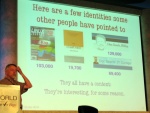|
Doc gives the closing keynote.
|
When we look at markets, we usually think of the transaction, but the exchange is only the bottom level of a market. Above that are conversations (ala Cluetrain) and above that are relationships. Federation is the relationship level of a market.
Gordon Eubanks pointed to the problem of silos, but the real silos are in our wallets. As an individual, I can't federate the relationships I have with various companies. I'm left to hope that the companies I care about get together.
Doc says "when we lost the industrial revolution (to industry) we lost the meaning of our names." Crafts we replaced by jobs, work was reduced to labor, and our occupations were reduced to positions somewhere in the org chart. The identity revolution has the power to give people back the meaning of their names.
Doc does a riff on podcasting and how it and the iPod are a response to the radio industry failing to meet the demands of the market. Lots of good stuff that I couldn't capture.
Doc wants rental car companies to compete for his business based on what kind of car he wants to drive. Right now, there's no way for that to happen, but technology could make it possible. Doc calls this "Company Relationship Management (CoRM)." CoRM is made possible by independent identity (ala i-names). CoRM can deliver on the idea that independent identities are where real marketing power comes from.
|
Drummond Reed shares the stage with Doc
|
Scott Mace talks about an important part of the CoRM problem: privacy. Scott says that its unreasonable to expect users to click thru privacy policies on devices like cell phones in a take it or leave it way. CoRM systems need a way to publish the complementary half of a companies privacy policy, that is my privacy policy. I added that privacy wasn't a thing, but a transaction. If users believe they are getting fair value for their identity information they will exchange it for what you're offering. CoRM system need to be built in a way that allows them to enter into negotiations about privacy.
Drummond says that an i-name is an independent identifier that is not attached to a specific mode of interaction or a specific company. Doc explains his fantasy about i-names: he's on the road a lot and drinks coffee a lot. He wants to talk into StarBucks with his card that is a pointer to his identity broker that can tell them that he wants a non-fat double latte. That card transcends everyone of the silos in his wallet.
Jamie Lewis says not to worry about the connection to Liberty and other protocols for individual identity. Develop the solar system (i.e. the mass of customers that will make big guys pay attention) and the relationships will form. The one thing big companies have figured out is that there will never be one way to do things.






